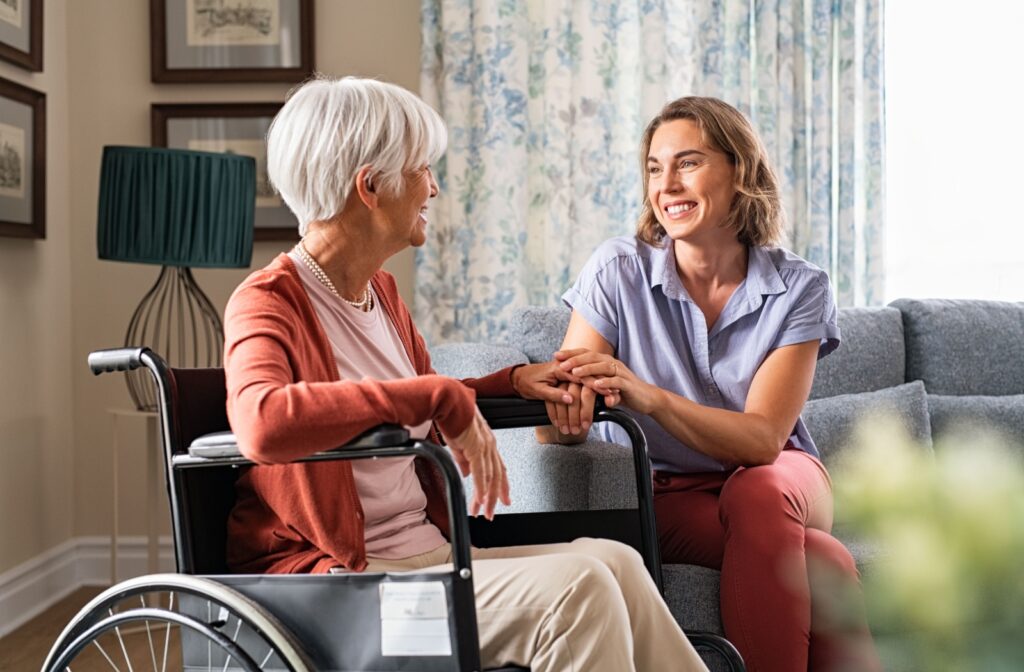Conversations with a loved one who has dementia might not always go as planned. Still, even the smallest moments of connection can mean everything. The right approach can turn frustration into understanding, helping your loved one feel heard and supported.
At Arbor Oaks Senior Living, we understand that compassionate communication is essential for providing quality dementia care. Patience, active listening, nonverbal cues, and minimizing distractions are effective ways to foster clear communication with your loved one.
Whether you’re offering gentle reminders or sharing a quiet moment together, knowing how to communicate clearly can make caregiving easier. And if you’re considering memory care, our team can offer the specialized attention your loved one deserves.
Why Is Communication Important for Those with Dementia?
Seniors with dementia experience changes in their ability to process and articulate thoughts. Simple conversations can become confusing, and their responses may not always align with what you expect.
Effective communication helps alleviate frustration—for both you and your loved one. It allows your loved one to feel valued, heard, and understood, promoting emotional well-being and cooperation.
1. Speak Clearly & Calmly
When someone feels unsure of their surroundings or situation, they may struggle to process what’s being said to them. Seniors with dementia can be especially vulnerable to this uncertainty. Using clear and gentle communication can ease their anxiety.
- Use straightforward words & short sentences
- Speak slowly & maintain a calm, warm tone of voice
- Avoid rushing through conversations or raising your voice
For instance, instead of asking, “What do you want to do today?” simplify your question to, “Do you want to sit outside or watch TV?” Simplifying your speech helps them focus on the message, making interactions more pleasant for you both.
2. Maintain Eye Contact
Eye contact is critical to building trust and engaging your loved one in conversation. Help your loved one stay focused by:
- Facing them directly & holding their gaze while speaking
- Using facial expressions to reinforce your words (e.g., smiling to convey positivity)
Your focused attention signals that you are fully present and value what they say. It’s a small gesture that can be comforting and help your loved one feel secure.
3. Use Nonverbal Cues
Communication isn’t always about words. Gestures, body language, and facial expressions can often convey more than speech, especially when verbal understanding becomes challenging. Common nonverbal communication cues include:
- Pointing to objects or using hand motions to help clarify your meaning
- Smiling, nodding, or using a gentle touch to provide reassurance
For example, if you want to guide them to the kitchen, you can point or gently lead them while saying, “This way to the kitchen.” Nonverbal communication complements your words and helps reinforce understanding.
4. Be Patient & Give Time to Respond
Seniors with dementia may need extra time to process information and respond. Interrupting or rushing them can create confusion or agitation. Practice patience by adjusting your pace to match theirs:
- Pause after asking a question to give them ample time to reply
- Repeat yourself calmly if needed
- Use empathetic phrases like, “Take your time; I’m here to listen”
5. Minimize Distractions
A noisy or chaotic environment can overwhelm someone with dementia, making it even harder to focus or engage in a conversation. You can help minimize distractions by:
- Reducing background noise by turning off the TV, radio, or other devices
- Choosing quiet, familiar settings for conversations
- Having conversations in smaller groups
6. Use Names & Familiar Words

Familiarity can provide comfort and reduce confusion for seniors with dementia:
- Address your loved one by name
- Encourage your loved one to use familiar names for you & family members
- Use simple, familiar phrases when speaking
- Avoid overly complex or abstract language
For example, instead of saying, “We need to go to the grocery store later,” try, “[Your Name] will go get groceries after lunch.” Simplified phrasing reinforces a sense of stability and helps them feel more connected to their environment.
7. Ask Simple, Direct Questions
When asking questions, keep them straightforward to avoid overwhelming your loved one. For example, you should:
- Opt for yes-or-no questions or provide limited choices
- Ask, “Would you like tea or coffee?” instead of “What would you like to drink?”
These types of questions simplify decision-making and allow your loved one to participate comfortably in the conversation.
8. Listen Actively
Communication is a 2-way process. Even if responses are unclear or unrelated, your loved one wants to feel heard and understood. You can show you’re listening by:
- Nodding or maintaining eye contact
- Making affirming statements like, “That’s interesting,” or “I understand”
- Acknowledging their feelings, even if their words don’t entirely make sense
Active listening fosters trust and shows that you value their thoughts and emotions, helping loved ones feel more connected and appreciated.
9. Stay Positive & Reassuring
Seniors with dementia often experience moments of confusion or agitation that can lead to frustration. Your demeanor can make a significant difference during these instances.
- Smile frequently & maintain a warm, positive tone.
- Use reassuring phrases like, “You’re safe here” or “There’s no need to worry”
Redirection can also help. For example, if your loved one insists on leaving the house for an appointment that doesn’t exist, gently steer the conversation elsewhere instead of denying their belief outright. Remaining positive keeps interactions soothing and constructive.
10. Use Visual Aids & Prompts
Visual memory tools can spark recognition and facilitate conversations. Simple ways to add visual aids include:
- Incorporating photos, memory books, or notes to recall people, places, or events
- Using written reminders (e.g., labels on drawers or sticky notes) to support day-to-day activities
By providing visual cues, you help reinforce their connection to cherished memories and surroundings, reducing anxiety and fostering conversation.
Building Stronger Connections with Community
Effective communication can make a world of difference when caring for a loved one with dementia. You can create meaningful connections and support their well-being with patience, empathy, and the right techniques.
At Arbor Oaks Senior Living, we’re here to help. With our memory care services, our team can offer personalized support in a safe and comforting environment. Contact us today to discover how we can support you and your loved one.


